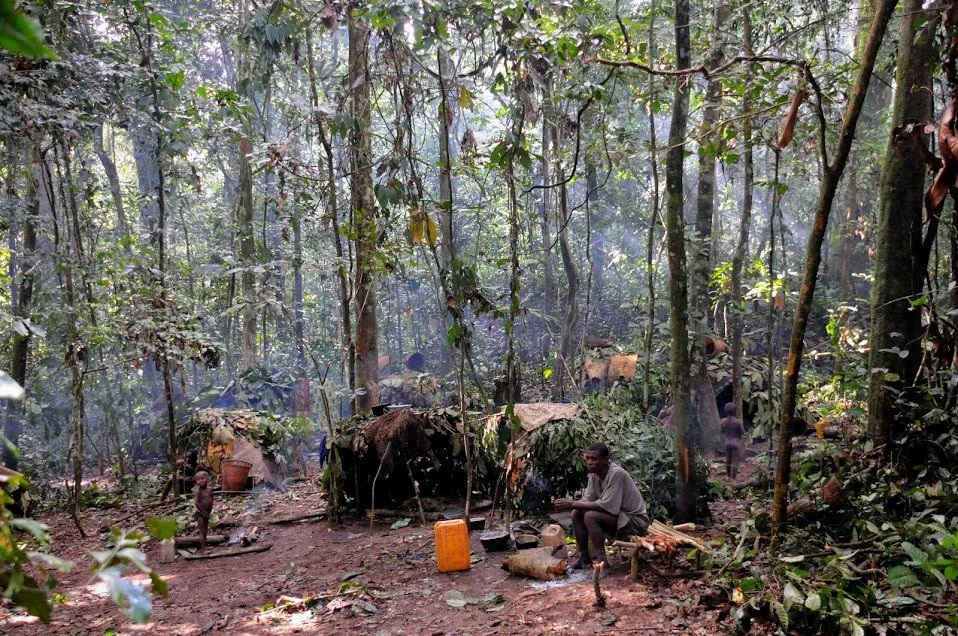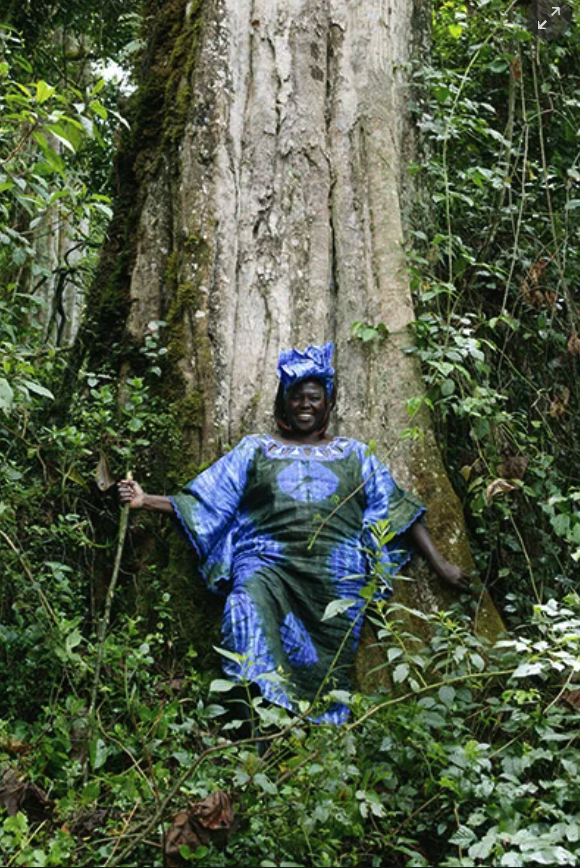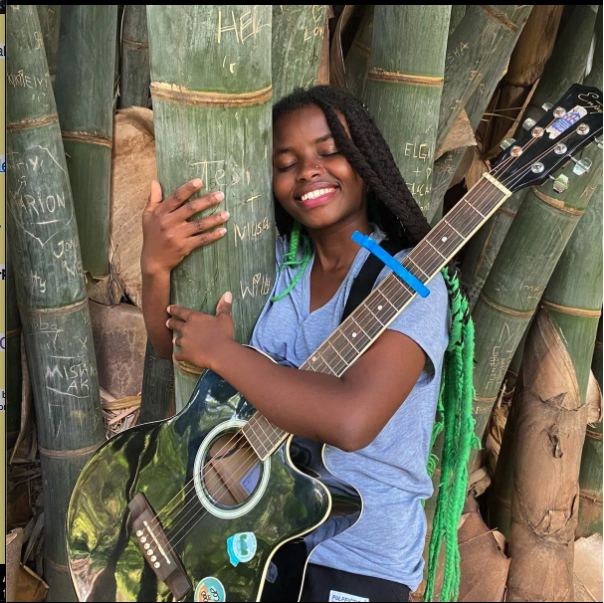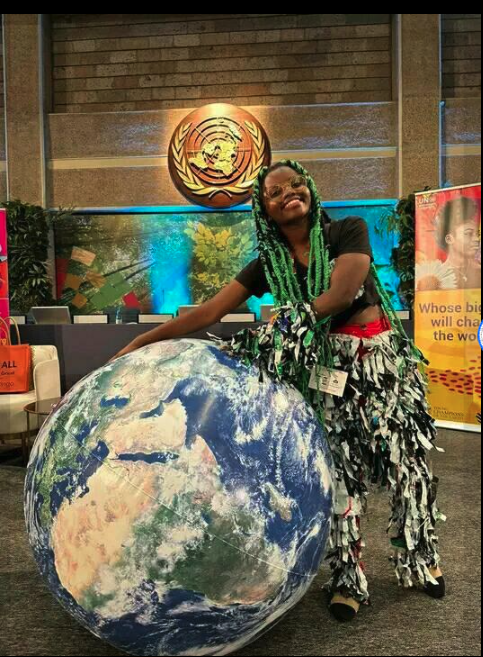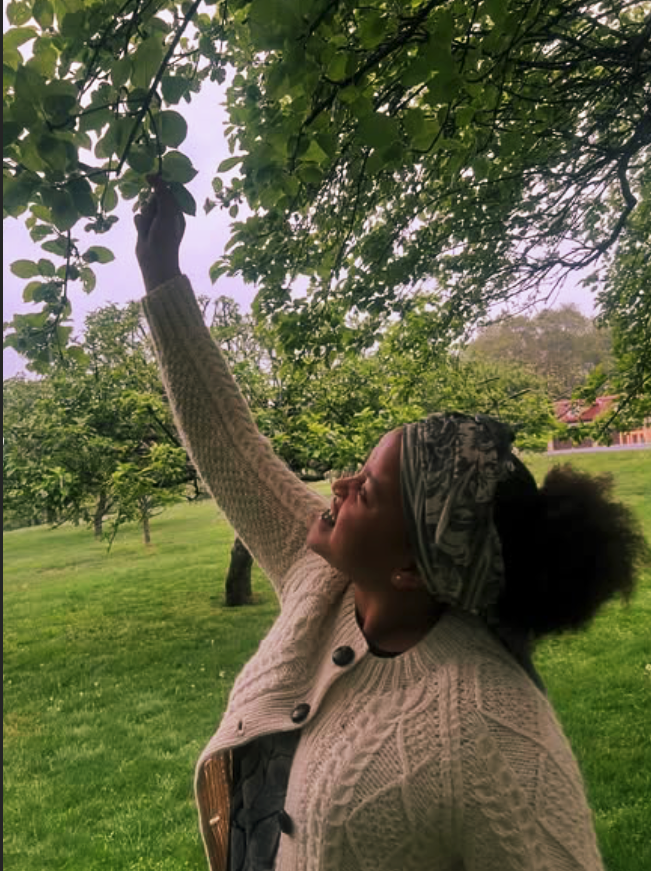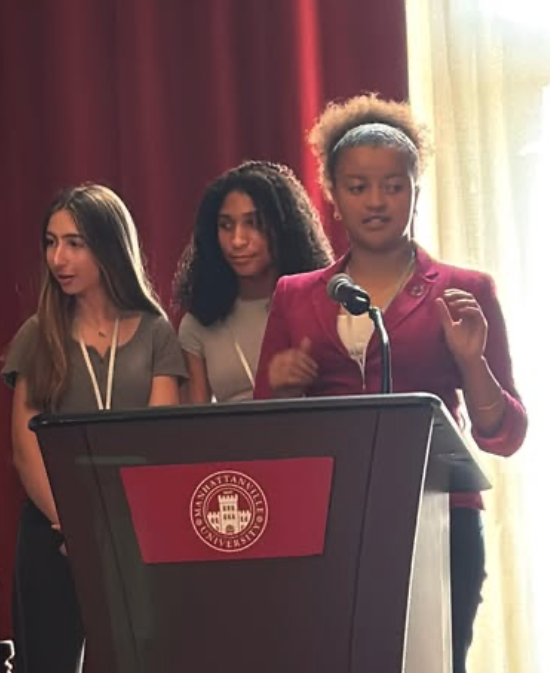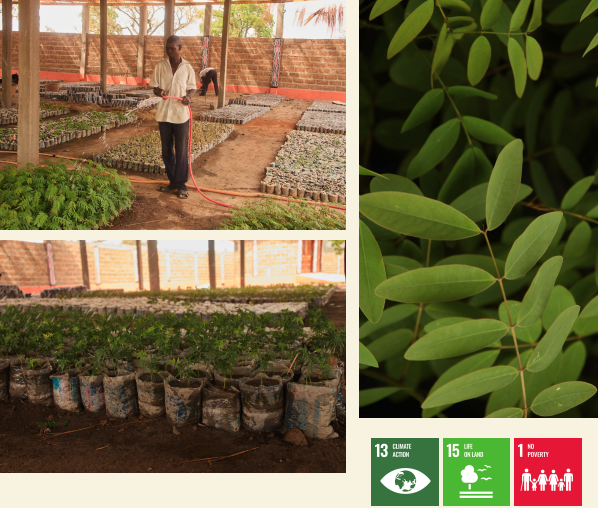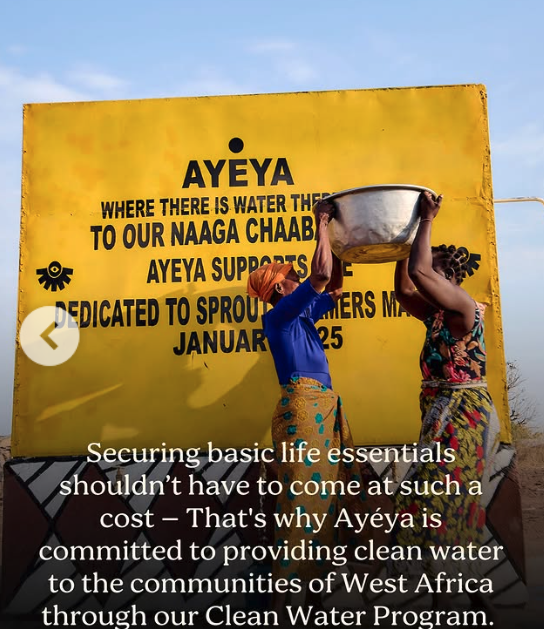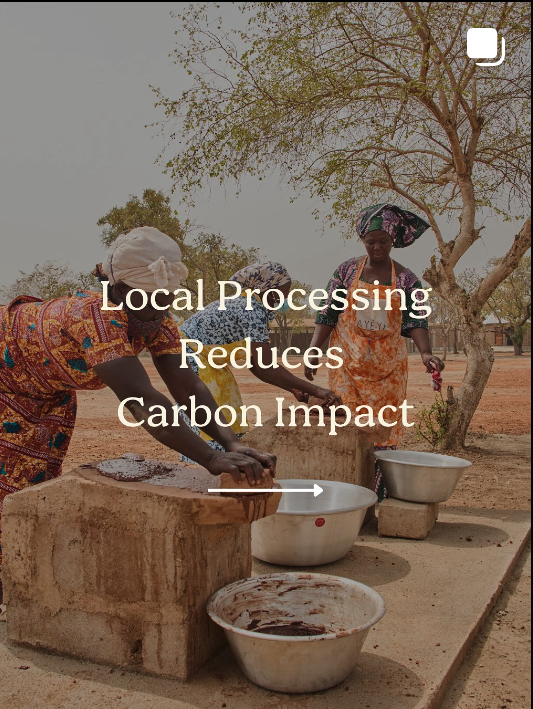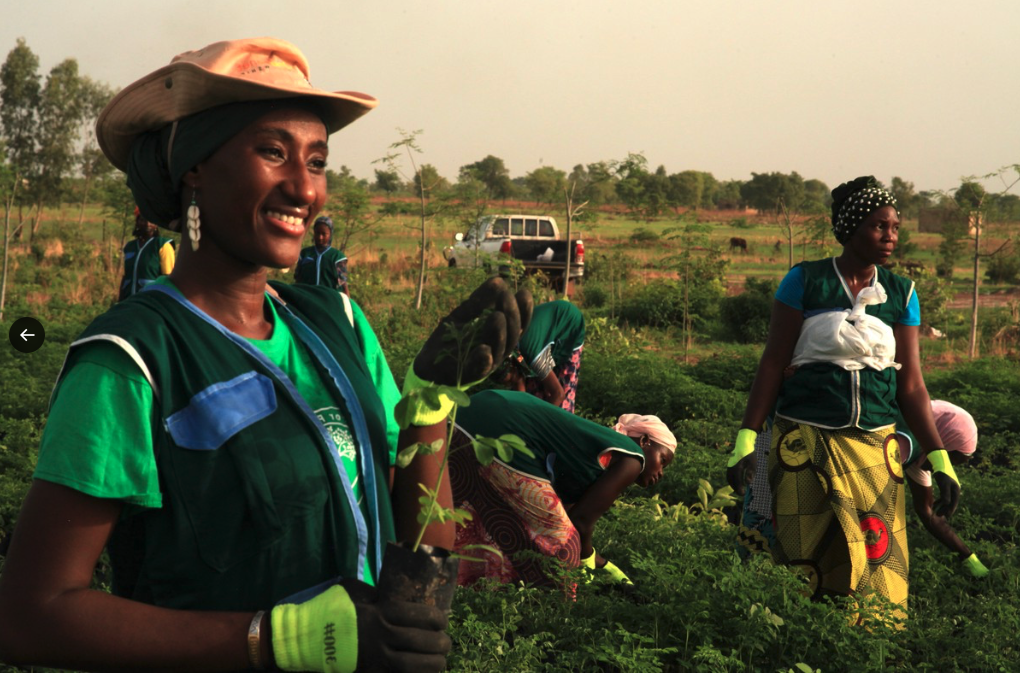
African tropical terrains are the Earth’s largest sequester of carbon emissions. Forest conservation is critical to overall planetary health
Bayaka people in the Dzanga Sangha Ndoki reserve. Central African Republic rainforest.
Photo: JMGracia100 via commons.wikimedia.org
Wangari Muta Maathai set off a nation-wide tree planting movement in Kenya to counteract desertification, the process in which fertile land become semi-desert and desert. Well before the time of her transition, she was aware of climate change resulting from burning fossil fuels and the benefits of tree planting to help mitigate that and other negative environmental impacts linked to industrial and commercial development. On a more primal level, tree planting helps mitigate the over chopping of trees for fire wood as a result of populations becoming more dense in Africa.
Maathai’s Green Belt project has planted an estimated 45 million to 51 million trees. Now her memory and spirit inspire a burgeoning phenomena of tree planting, forest conservation, and conservation-inspired performance art across the African continent.
Contents of this series:
Young Kenyan breaks Guinness world record for longest tree hugging marathon
Kenyan teen plants trees around the world
The “son of Africa” who is on a mission to plant trees while empowering West African women
Mali’s planter and purveyor moringa trees
Ethiopia’s 20 billion tree initiative.
The tree-planting mayor of Sierra Leone's capital
Kenyans get tree-planting holiday
The mighty scientist and activist Wangari Maathai (1940-2011)
Trees in Africa’s Green Belt continue to flourish from her legacy.
Photo: Micheline Pelletier/Corbis
Young Kenyan breaks Guinness world record for longest tree hugging marathon
In February 2025, in a feat recalling the environmental heroism of the late Kenyan environmentalist and Nobel peace prize winner Wangari Muta Maathai, Truphena Muthoni didn't just hug a tree; she embraced it to shatter the Guinness World Record for the longest tree-hugging marathon.
She held on for 24 hours and 21 minutes!
The 21 year old activist is on a mission to promote understanding that “if we destroy nature, we destroy ourselves.”
The Kenya Forest Service says her sights are set even higher, aiming for a 48-hour embrace. Truphena Muthoni is becoming an inspiring role model much like Maathai's Green Belt Movement sparked a nationwide environmental consciousness. “As we celebrate her dedication, let's remember to embrace and protect nature every day," the forest service said.
Achieving this record wasn't easy. Muthoni dedicated five months to rigorous preparation, including training her body to endure extended periods without food, water, and restroom breaks, reports the Kenyan Star news.
In her Unbowed memoir, Wangari Maathai recalls the moment in 1977 when impelled by the “harambee” (“Let us all pull together”) principle, she envisioned an initiative that “would inspire Kenyans, both wealthy and poor, to plant trees to protect our country from desertification.” The unanticipated failures of that project guided the successful development of the Green Belt Movement.
Through the Green Belt, Kenyans would not only help them selves and their land but also, said Maathai, “safeguard the livelihoods of millions of small-scale farmers from the Sahara Desert’s spread southward and the drying out of land as forests were cleared.”
With great foresight and lateral vision, Wangari Maathai was looking into the future and across nations.
Like Maathai, Truphena Muthoni is playing the long game. She describes herself as a “sustainability musician” for both trees and people who are becoming disconnected from nature.
In the U.S., “tree huggers” became a disparaging term for those deemed as over-zealous environmentalists. But as Muthoni stands heart to heart with the tree, her message is simple, forceful and clear: Hug trees. Imbibe their energy. Bathe in warm leafy sunlight. Get grounded. Reduce stress. Protect ourselves and the planet.
Photos from Truphena Muthoni’s Facebook page
She calls herself “The Tree Girl of Africa”
The Kenyan teen has facilitated the planting of over 1.3 million trees around the world
Photos from Ellyanne Wanjiku Chlystun’s Instagram account
Perceiving that significant accomplishments are within a child’s reach, just as they are for adults, increased Ellyanne's drive to achieve. She also will learn, if she hasn't already, that great achievement is most often not widely publicly reported. Human beings everywhere are achieving greatness in countless ways by becoming self-realized and helping others — that’s the primary purpose of life, not public recognition.
In any case, Ellyanne's public recognition continues. On May 4, 2025 she was awarded an United Nations Association of the USA appreciation for the significant global contributions to environmental protection, health and climate change action in the spirit of the sustainable development goals of the United Nations.
And she doesn’t just talk the talk, she walks it by directing fundraising for her causes.
Ellyanne is very “spiritual” in both traditional Christian and timeless mystical ways. She devoutly believes in God, prays a lot, and occasionally witnesses “signs.” Despite having strong convictions and support, she still gets nervous about participating at major public events. (See Instagram post on the right.) Honesty and humility keep her grounded as the accomplishments and accolades pile up.
One of Ellyanne Chlystun-Githae’s goals is to catalyze the planting of one trillion trees worldwide by the time she turns 18. Whew! But her professional goal is not just botanical: she wants to become an economist.
Watch a snippet of my speech Manhattanville University at the inaugural Young Women Leaders Forum. My intervention was of taking action. 💖 it’s a responsibility by all of us. 👇 WATCH
https://westchester.news12.com/summit-to-empower-young-women-held-at-manhattanville-university
When she was a four-year old Kenyan preschooler viewing an colorfully illustrated chart of the World’s great historical figures like Florence Nightingale and Martin Luther King, Ellyanne Wanjiku Chlystun Githae immediately knew she wanted to be like the amazing tree planting activist Wangari Maathai. It wasn’t just a passing fancy to be dropped as soon as Beyonce bounced into view. As the child’s aspiration persisted, her mother encouraged a different direction. Mom knew that as Wangari’s interests in tree planting and women’s rights converged, she endured great ordeals including being imprisoned after she began running for political office.
But as Ellyanne planted a seed from a piece of fruit to see how it would grow, her determination to follow in Wangari’s footsteps increased and was reinforced as she saw how an individual effort, even by a child, can have on the environment. By age 14, she had facilitated the planting of over 1.3 million trees in several countries. At home, her focus includes the restoration of mangrove forests in Kenya's coastal communities, recognizing the critical role these ecosystems play in biodiversity and climate resilience. And she wants to continue to plant trees along Africa's Green Belt to combat desertification, as Wangari Maathai envisioned in 1977.
Ellyanne's achievements are recognized both nationally and internationally. In 2018, she received Kenya's prestigious Mashujaa (Hero) Award, sharing this honor with the renowned marathon runner Eliud Kipchoge. Further accolades followed, including the Eco-Warrior Award. In 2023, she was nominated for the International Children's Peace Prize for her global impact as a young activist.
She also has emerged as a powerful voice on correlations of climate change and health. In 2023, she was appointed the Youngest Global Malaria Ambassador, traveling to malaria-affected communities in Kenya and Zimbabwe to advocate for greater awareness and action. And she has starred in an international Zero Malaria campaign with fellow malaria activist David Beckham.
Her work in public health extends to her role as the youngest champion appointed by Kenya's Ministry of Environment & Forestry for the rehabilitation of Michuki Memorial Park in Nairobi, a vital green space that provided solace during the COVID-19 pandemic.
And she is co-founder and CEO of Children With Nature, a non-profit organization dedicated to empowering children to become environmental stewards through education and conservation efforts. Her influence extends to international platforms, where she has addressed gatherings at the United Nations Framework Convention on Climate Change (UNFCCC) and World Health Organization (WHO) events, including COP28 in Dubai. There, she met King Charles and spoke about the critical link between climate change and the rise of malaria.
The “son of Africa” on a mission to plant trees while empowering women
“Climate change will be at the forefront for me for the rest of my life. The continent of Africa will be the one that will suffer the most from climate changes. And I see every day, I see our farmers suffering as the wind pattern changes. I see the dry areas, the trees dying in the North, the population growth exploding…. Clearly we have to do something.”
Olowo-n’djo Tchala was not speaking to fellow environmental activists when he made this statement. He was being interviewed for an article on a shopping platform for health and beauty products that was updated in March 2024. And the “something” that must be done, was to seed trees in a nursery in Ghana and plant them. By the time of this report, 99,964 trees had been planted from seedlings grown at the Allafia nursery. But trade newsletter content can be updated to appear current by simply changing the dateline. In live statements in 2024 and 2025, Olowo-n’djo Tchala was representing another personal care product line, Ayéya, which also has a tree planting component.
Tree planting is one part of Olowo-n’djo Tchala’s interconnected environmental and humanitarian mission. Other facets include building wells for clean water, domestic violence prevention (including genital mutilation which Tchala learned about from his mother) and waste production reduction.
When Olowo-n’djo Tchala was growing up in Togo, the nearest source of water was a long and arduous walk, and the wisdom of traditional healers intertwined with the harsh realities of poverty. He witnessed the daily struggles faced by his mother, one of his father’s four wives, and other women.
His situation shifted momentously when he met Peace Corps volunteer Prairie Rose Hyde. In 2003, Tchala and Hyde co-founded Alaffia, a social enterprise built on the principle of fair trade. More than just a beauty and body care company, Alaffia was conceived as a vehicle for the financial security of West African women and the development of their communities. By sourcing indigenous ingredients like shea butter directly from women’s cooperatives in West Africa at fair prices, Alaffia disrupted traditional exploitative trade practices.
Driven by an ever-expanding vision for holistic impact, Tchala launched Ayéya in 2022. This new venture builds upon the foundations of Alaffia while broadening its geographical reach. Ayéya, meaning "balance" in a West African language, reflects Tchala’s philosophy of interconnectedness – the well-being of people and the planet are inextricably linked. Through Ayéya, he continues his commitment to ethical sourcing, artisan craftsmanship, and community empowerment, now encompassing initiatives in Latin America and the United States alongside ongoing work in West Africa
His concern about the urgent need for environmental stewardship has manifested in significant environmental activism. Both Alaffia and Ayéya have robust tree planting initiatives. Alaffia has been actively involved in reforestation efforts in Togo and Ghana, working with local farmers to plant trees that combat soil erosion and enhance food security.
Ayéya has set an ambitious goal to plant 100,000 native trees annually to combat climate change and help restore biodiversity in forests under threat of deforestation and desertification. The company’s comprehensive program includes expanding beyond the initial nursery to establish on-site nurseries in various areas and provide local communities with training in sustainable land management techniques.
Olowo-n’djo Tchala said that wth Ayéya, he is building on the Alaffia experience but did not indicate whether he was still involved with Alaffia, during a video interview at a trade show that was posted on April 30, 2025.
Elaborating on Ayéya’s tree planting project during the interview, he said, “After we sell the product, 15% for everything that coming out of West Africa goes back to West Africa and part of that 15% then goes into the nurseries… and we plant baby trees across the northern part of Ghana and Togo. So last year about 30,000 trees and we’re on track to plant about 100,000 trees.” And explaining what the tree planting means for the environment, he said One, we use a recycled packaging that has less impact on the climate and second we make sure that the ingredients going into the product don’t have negative impacts on the planet… .And the third part is paying fair wages so the people engaged in collecting the nuts are not destroying the trees because they see all the value that comes from them.”
Ayéya’s “Impact Report” provides an overview of the tree planting program which includes this description of the nursery and its outreach:
“…we grow fruit-bearing trees to support local nutrition, shea trees to empower communities through shea butter production, and species with ecological benefits to sustain the environment. Working closely with local communities, we provide hands-on training in sustainable practices like organic farming, grafting, and tree propagation.”
Views of Ayéya’s tree nursery from company website
Olowo-n’djo Tchala discussing Ayéya at trade show. Still image from trade show video. The packaging for Ayéya products is minimal, thin and more biodegradable.
Still image of Olowo-n’djo Tchala from video on his Instagram account
Another step for ethically-sourced, fair trade, “clean’ natural ingredient product companies is to consider the the use of packaging that can quickly degrade to soil in the consumers’ yards.
Also Tchala says that Ayéya’s small product line is intentional because in his continuing tradition, the same soap should be able to be used for hair, face, body and hands. Consumerist-directed corporate business contributes to unnecessary and excessive speciaization of wares, and waste.
Allafia product line, the fifth highest-selling personal body care product in the U.S.
Ayéya’s clean water program, has facilitated the construction of deep water wells and implemented water purification initiatives in West Africa. Ayéya aims to provide five million daily servings of safe water annually and plans to build 17 solar-powered water tanks.
Rokiatou Traoré's massive moringa tree planting is greening the Sahel and creating healthier and all around more prosperous communities
Rokiatou Traoré and her team cultivating morgina plants in Mali. Photo: Traoré X account
Rokiatou Traoré: from becoming an entrepreneur to joining international negotiations on climate, she has embarked on an inspiring path for climate action. View video here: We spoke to her about her journey.
Traoré (in green shirt, front row) and the planters. Photo: Traoré X account
Delightful introduction to Rokiatou Traoré’s website. View it here.
Moringa oleifera leaves. Photo: Obsidian Soul, Wikimedia Commons
In the heart of Africa’s Sahel region, where the challenges of climate change, poverty, and food insecurity loom large, one woman is advancing Wangari Matthai’s Green Belt vision with a goal to plant 10 million moringa trees by 2030. And the 33-year-old Malian entrepreneur, is not just planting trees; she's planting hope, resilience, and economic opportunity for thousands, propelled by the "miracle tree."
Rokiatou Traoré is the visionary co-founder and CEO of Herou Alliance, a social enterprise that's rapidly transforming Mali's landscape and the lives of its women. She refers to the enterprise as a thriving, “inclusive value chain” because it financially empowers the women who plant and harvest the trees, combats desertification and deforestation (in West Africa, a lot of trees are felled for wood cooking, fuel) and has great health benefits for consumers of her Alliance’s moringa teas, supplements and infused honey.
Moringa products “can help lower high blood pressure, cholesterol, and blood sugar levels. It cleanses and boosts the immune system," she says, and also notes its role in combating malnutrition, especially among infants and nursing mothers.
Traoré discovered moringa tea while she was living in Turkey and studying for the MBA at the University of Istanbul.
Since co-founding Herou Alliance in 2019, with her late husband, Traoré has been a whirlwind of activity. The company has already trained nearly a hundred women as moringa producers, cultivated tens of thousands of moringa trees in the Koulikoro region, and developed an impressive range of organic moringa products. From nutrient-packed powders and teas to oils, soaps, spices, and even baby food, Herou Alliance's offerings are now exported to over seven countries.
Beyond the economic boons is the climate change benefit: moringa trees are known to absorb significantly more carbon dioxide than many other trees. And it’s drought resistance and begins produces leaves three months after planting.
Traoré was able to mount a successful start-up and expand the mutual benefit enterprise through investors such as the Barka Fund which promotes community and environmental outcomes.
During an interview on a Barka Fund video, she envisioned a devastating future and then re-envisioned it. Noting that she has two young sons, she said that by 2050, she will be 58 and one of her sons will be 30 years old, the age she was when she started the business “but they probably will never have the same chance to build their own company because according to IPCC, if nothing is done the West African population will be forced to move because of extreme weather and drought. I don't dream of my future where my children will be migrants.
That's the reason why I've started Herou Alliance. Our dream right now is to restore millions of degraded lands. The moment we will really achieve this goal is by 2030 when we succeed in planting 10 million high value trees not only moringa (but various) high value trees that can survive in arid and semi-arid lands.
And that (2030) is when we (will) empower over 150 thousand women and young farmers in agroforestry and when these people have decent and decent source of incomes throughout the year. And it's also when we see high value and nutritious products in the daily diet of every African with moringa and other agroforestry species that are very beneficial.”
The tree planting mayor of Sierra Leone’s capitol
Yvonne Aki-Sawyerr
The tree-planting mayor of Sierra Leone's capital, Freetown, is Yvonne Aki-Sawyerr. She is known for her ambitious "Transform Freetown" agenda, which includes a major tree-planting initiative aimed at increasing the city's vegetation cover by 50%. This initiative, called "Freetown the Treetown," involves planting a million trees within two years to combat deforestation, reduce disaster risks like flooding and landslides, and improve biodiversity.
Aki-Sawyerr's efforts have gained international attention, with features in TED Talks, National Geographic, and BBC News Africa. She has also been recognized by the Earthshot Prize for her "pay-to-grow" scheme to incentivize residents to plant and monitor trees, according to Earthshot Prize. Her work addresses the climate emergency facing Freetown, which experiences extreme rainfall, flooding, and landslides, exacerbated by deforestation

